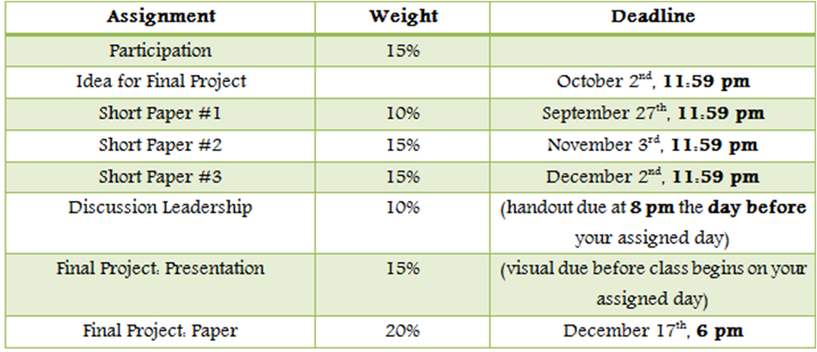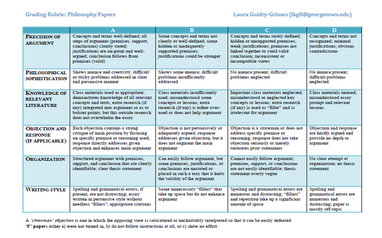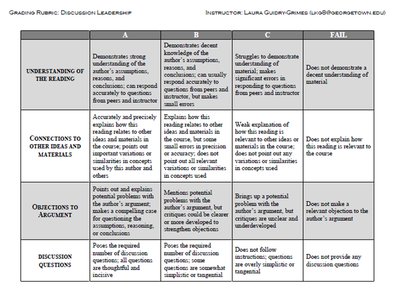Deadlines
Writing help
|
Important files to download:
Example of an 'A' short paper for prompt #1:
Prompts for these short papers are here.
|
Grading rubric for papers:
For writing tips, go to
A Rulebook for Arguments Purdue Online Writing Lab The Elements of Style MLA Handbook |
||||||||||||||||||||||||||||||
Discussion Help
Grading rubric for discussion leadership:
instructions
Short writing assignments:
These papers should each be 750 words in length. Submit to Blackboard (under Assignments), and be sure to cite correctly.
Prompt #1:
This paper is purely expository; you should not critique the arguments or bring in your own analysis or research. Only use class materials. You may bring in examples or analogies if they help explain the position, but be careful not to use too much space describing your example case. Here's the prompt:
What is the myth of the in-control agent? Briefly describe the Kant-inspired argument that we are isolated "willers" who are not deeply dependent on others for autonomous agency. Identify and carefully explain one or two arguments (given in our readings) for why we should view this Kantian account as a myth.
(Note: You should not have enough space to explain alternative views--such as relational conceptions of autonomy. Just focus on what the traditional Kantian conception is and what philosophers have pointed out as crucial problems with it. Keep in mind your goal should be depth, detail, and precision--not breadth.)
Prompt #2:
This paper is purely compare/contrast; you should not critique the positions or argue for the superiority of one view over the other. Carefully explain how the philosophers' views differ or where they agree--keeping an eye on the prompt:
Analyze the alleged East/West disagreement on how autonomy should be conceived as a principle in bioethics. How deep is this disagreement? Is any agreement whatsoever possible? What are the implications of this purported divide? (In other words, what does it matter?) Focus on analyzing the disagreement and potential agreement that philosophers in different regions have on this issue. Define relevant terms, and be careful not to spend too many words merely summarizing their points. In order to make a compelling analysis in 750 words, it would be prudent to focus on one particular aspect of autonomous decision-making or agency where there is significant divergence. Depth matters more than breadth. You may use whatever class texts (but only class texts) you want.
Prompt #3:
In this paper, your task is to provide a single compelling criticism of a philosophical position. Do not waste words giving too much in the way of exposition or context for the debate; focus on developing one nicely nuanced and precise counterargument to the stated position:
In order to have a disability-conscious bioethics, we should focus on recognizing that physical disability, as such, does not impair autonomous, free, and voluntary decision-making. Promoting equal recognition of disabled persons is best achieved by ensuring that they have the same options as non-disabled persons. We should focus on maximizing choices, regardless of how recent or profound the disability is. Thus Elizabeth Bouvia and Dax Cowart should have had their desire to die respected. Giving them this choice (among others) is ethically required if we are to protect their autonomy interests.
Your counterargument should keep in mind what bioethics (as an academic field and practice) should advocate or promote for physically disabled persons. Consider the cases of Bouvia and Cowart in your critique, and define relevant terms. This criticism should be your own; don't simply summarize what someone else says. You may use whatever class texts (but only class texts) you want.
Discussion leadership:
On your chosen day, you will lead discussion for about 20 minutes. You need to have a handout prepared for one reading (e.g., one chapter or article) for the day. The handout should connect the reading to other ideas or materials in the course, point out some potential problems with the argument, and list at least three thoughtful discussion questions. I will outline the argument, so you should not include this exposition in your handout. You must submit the handout to Blackboard (look under ‘Assignments’) by 8 PM the day before your assigned date. Your classmates will be able to access your documents once you upload them.
Final project:
You should find a topic relevant to the course that excites you. The topic should be manageable; in other words, “paternalism in the law” is not a manageable topic because it is too vast. Narrow in on a smaller topic that you can lay out and discuss critically. Once you find an alluring bioethical problem, you will need to research some of the necessary facts related to the topic, and you will also need to reflect on the relevant arguments that scholars have published. Then you need to make your own contribution to the debate. This project is meant to serve as a launching pad in case you wish to pursue it in the future for advocacy or scholarship purposes. You are free to take up any well-argued and well-researched position you find compelling. You need to email me by Wednesday, September 26th what your idea is for this project (failure to do so will affect your participation grade). The final project is split into two parts with different deadlines:
1) Final Presentation: You will choose a day on which to present your research and your argument. Tell us a) what the ethical problem is, b) how you think the problem should be understood or resolved, and c) what is most challenging about this issue. This presentation is an opportunity for you to get feedback from your peers and me in preparation for your final paper. You will have ten minutes to present and five minutes for Q&A. A visual is required, and it should be, for example, a Power Pont, Keynote, or a website. You will submit the presentation through Blackboard (look under ‘Assignments’) any time before your assigned day to present.
2) Final Paper: This paper must be on the same topic as your final presentation, though you are welcome to change your argument or stance on the issue. Your paper needs to a) lay out the ethical issue, b) explain and analyze some published viewpoints on the topic, c) carefully and precisely argue how you believe the problem should be understood or resolved, and c) provide a compelling objection to your position. If you have the space, I will give extra points for including a nicely reasoned response to the objection. The final paper is due on December 17th by 6 pm (our final exam slot). You need to write 5-7 double-spaced pages in Times New Roman 12 point font, one inch margins on all sides. You need to submit it through turnitin.com.
These papers should each be 750 words in length. Submit to Blackboard (under Assignments), and be sure to cite correctly.
Prompt #1:
This paper is purely expository; you should not critique the arguments or bring in your own analysis or research. Only use class materials. You may bring in examples or analogies if they help explain the position, but be careful not to use too much space describing your example case. Here's the prompt:
What is the myth of the in-control agent? Briefly describe the Kant-inspired argument that we are isolated "willers" who are not deeply dependent on others for autonomous agency. Identify and carefully explain one or two arguments (given in our readings) for why we should view this Kantian account as a myth.
(Note: You should not have enough space to explain alternative views--such as relational conceptions of autonomy. Just focus on what the traditional Kantian conception is and what philosophers have pointed out as crucial problems with it. Keep in mind your goal should be depth, detail, and precision--not breadth.)
Prompt #2:
This paper is purely compare/contrast; you should not critique the positions or argue for the superiority of one view over the other. Carefully explain how the philosophers' views differ or where they agree--keeping an eye on the prompt:
Analyze the alleged East/West disagreement on how autonomy should be conceived as a principle in bioethics. How deep is this disagreement? Is any agreement whatsoever possible? What are the implications of this purported divide? (In other words, what does it matter?) Focus on analyzing the disagreement and potential agreement that philosophers in different regions have on this issue. Define relevant terms, and be careful not to spend too many words merely summarizing their points. In order to make a compelling analysis in 750 words, it would be prudent to focus on one particular aspect of autonomous decision-making or agency where there is significant divergence. Depth matters more than breadth. You may use whatever class texts (but only class texts) you want.
Prompt #3:
In this paper, your task is to provide a single compelling criticism of a philosophical position. Do not waste words giving too much in the way of exposition or context for the debate; focus on developing one nicely nuanced and precise counterargument to the stated position:
In order to have a disability-conscious bioethics, we should focus on recognizing that physical disability, as such, does not impair autonomous, free, and voluntary decision-making. Promoting equal recognition of disabled persons is best achieved by ensuring that they have the same options as non-disabled persons. We should focus on maximizing choices, regardless of how recent or profound the disability is. Thus Elizabeth Bouvia and Dax Cowart should have had their desire to die respected. Giving them this choice (among others) is ethically required if we are to protect their autonomy interests.
Your counterargument should keep in mind what bioethics (as an academic field and practice) should advocate or promote for physically disabled persons. Consider the cases of Bouvia and Cowart in your critique, and define relevant terms. This criticism should be your own; don't simply summarize what someone else says. You may use whatever class texts (but only class texts) you want.
Discussion leadership:
On your chosen day, you will lead discussion for about 20 minutes. You need to have a handout prepared for one reading (e.g., one chapter or article) for the day. The handout should connect the reading to other ideas or materials in the course, point out some potential problems with the argument, and list at least three thoughtful discussion questions. I will outline the argument, so you should not include this exposition in your handout. You must submit the handout to Blackboard (look under ‘Assignments’) by 8 PM the day before your assigned date. Your classmates will be able to access your documents once you upload them.
Final project:
You should find a topic relevant to the course that excites you. The topic should be manageable; in other words, “paternalism in the law” is not a manageable topic because it is too vast. Narrow in on a smaller topic that you can lay out and discuss critically. Once you find an alluring bioethical problem, you will need to research some of the necessary facts related to the topic, and you will also need to reflect on the relevant arguments that scholars have published. Then you need to make your own contribution to the debate. This project is meant to serve as a launching pad in case you wish to pursue it in the future for advocacy or scholarship purposes. You are free to take up any well-argued and well-researched position you find compelling. You need to email me by Wednesday, September 26th what your idea is for this project (failure to do so will affect your participation grade). The final project is split into two parts with different deadlines:
1) Final Presentation: You will choose a day on which to present your research and your argument. Tell us a) what the ethical problem is, b) how you think the problem should be understood or resolved, and c) what is most challenging about this issue. This presentation is an opportunity for you to get feedback from your peers and me in preparation for your final paper. You will have ten minutes to present and five minutes for Q&A. A visual is required, and it should be, for example, a Power Pont, Keynote, or a website. You will submit the presentation through Blackboard (look under ‘Assignments’) any time before your assigned day to present.
2) Final Paper: This paper must be on the same topic as your final presentation, though you are welcome to change your argument or stance on the issue. Your paper needs to a) lay out the ethical issue, b) explain and analyze some published viewpoints on the topic, c) carefully and precisely argue how you believe the problem should be understood or resolved, and c) provide a compelling objection to your position. If you have the space, I will give extra points for including a nicely reasoned response to the objection. The final paper is due on December 17th by 6 pm (our final exam slot). You need to write 5-7 double-spaced pages in Times New Roman 12 point font, one inch margins on all sides. You need to submit it through turnitin.com.



